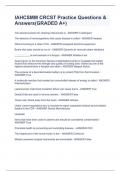Summary
Summary Seneca Notes for Classical Civilisation A-Level OCR
- Module
- Love and Relationships
- Institution
- OCR
A* Notes on Seneca for Love and Relationships Classical Civilisation A-Level including context, analysis of texts, quotes from scholars and themes like: - Love - Lust and Desire - Marriage and Relationships - Men and Women - Class, Luxury and Hypocrisy - Homoerotic Relationships - Philosop...
[Show more]







